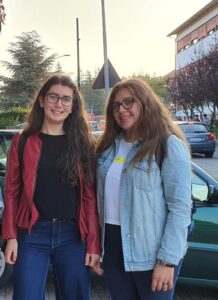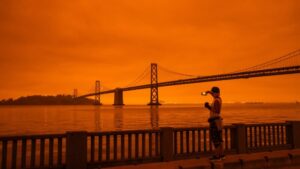Continua la collaborazione tra il liceo linguistico "Cattaneo dall'Aglio" e Redacon tramite la rubrica "Speakeasy" curata direttamente dagli studenti, dell'anno scolastico 2020-2021.
***

When we talk about climate changes, we tend to think only of scorching heat but it’s not so simple. Actually, the problem is more complicated: for instance, we have recent examples in Liguria of violent flash floods, which prove that climate change is happening now worldwide.
We all have imprinted in our minds the dreadful images of the fires and red sky of the US west coast. But how does it feel to be there?
Kristen Tranter, who is a writer and a literary critic, tried to explain to us her personal experience about the latest fires, which took place in Sydney and San Francisco with an article in The Guardian published on 14th September 2020.
She now lives in Berkeley, a small town near San Francisco Bay.
She begins by saying that San Francisco is said to be really similar to Sydney for its conformation and climate; unfortunately we can find this same similarity also in the terrible fires which have hit them almost over the same period. The “apocalyptic picture” that she gives us is a San Francisco invaded by a heavy fog of smoke and ash “falling like snow” which makes the sky look red because of the sunlight.
This is only one example of global warming, which is a problem that becomes more critical every day.
With global warming rains are less frequent and more destructive and when the rain is late the plants dry up. Dry vegetation is the ideal fuel for increasingly larger fires. In 2019 the burning season in Australia started early and was one of the most destructive ever.

We mustn’t forget the fires that in 2019 destroyed part of the Amazon forest, the lung of our planet. As we can see, these are not casual events. It cannot be ruled out that some of them are malicious, but at the end, the message is always the same: we are not doing enough to protect our planet. Wildfires or the polar ice caps that are melting are striking examples, even though we tend to feel they happen far from us. But everything in the world is connected and every catastrophic event is the result of more incorrect and irresponsible actions which can come from each of us.
In her article,Kristen Tranter says: ”I began to believe that this exceptional summer was actually a template for the seasons to come. Those past years would no longer be relevant points of comparison: this monster was destined to be the new reference point, the “new normal”.
This means that what we may consider exceptional is actually becoming the norm. Global warming is underway and will have many consequences on the environment and humanity, for example it will mean an increase in economic disparities between countries, even simply as regards access to supply of water.
(Anna Ascani and Milena Zanelli, classe 5^Q, Liceo Linguistico Dall’Aglio)
****

Quando parliamo di cambiamento climatico, tendiamo a pensare solo al caldo torrido, ma non è così semplice. Infatti, il problema è più complicato: per esempio, abbiamo esempi di recenti di alluvioni violente in Liguria, che provano che il cambiamento climatico avviene ora e in tutto il mondo.
Tutti noi abbiamo impresse in mente anche le immagini degli incendi e del cielo rosso della costa ovest degli USA, ma come ci si sente ad essere lì?
Kristen Tranter, che è una scrittrice e critica letteraria, cerca di spiegarci la sua personale esperienza sugli ultimi incendi che si sono verificati a Sydney e San Francisco con un articolo sul Guardian pubblicato il 14 settembre 2020.
Oggi vive a Berkeley, una piccola città vicino alla baia di San Francisco. La scrittrice comincia dicendo che San Francisco è nota per essere molto simile a Sydney per la sua configurazione e il clima; sfortunatamente possiamo trovare queste somiglianze anche nei terribili incendi che le hanno colpite quasi nello stesso periodo. Il “quadro apocalittico” che ci dà è una San Francisco invasa da una fitta nebbia di fumo e cenere che “cade come neve” e che rende il cielo rosso a causa della luce solare. Questo è solo un esempio degli effetti del riscaldamento globale, che è un problema che diventa ogni giorno sempre più critico.
Con il riscaldamento globale, le piogge sono meno frequenti e più distruttive, e quando tardano le piante seccano. La vegetazione secca è il carburante per incendi sempre più estesi. Nel 2019 la stagione degli incendi in Australia è iniziata prima ed è stata la più distruttiva di sempre. Non dobbiamo dimenticare neanche gli incendi che nel 2019 hanno distrutto parte della foresta amazzonica, il polmone del nostro pianeta. Come possiamo vedere, questi non sono eventi casuali. Non può essere escluso che alcuni di essi siano dolosi, ma alla fine il messaggio è sempre lo stesso: non stiamo facendo abbastanza per proteggere il nostro pianeta. Il fenomeno degli incendi o delle calotte polari che si sciolgono sono esempi evidenti, anche se tendiamo a sentirli come lontani da noi. Ma tutto nel mondo è collegato, e ogni evento catastrofico è il risultato di azioni scorrette e irresponsabili che vengono da ognuno di noi.
Nel suo articolo, Kristen Tranter dice: “ Ho cominciato a credere che questa estate eccezionale sia un modello per la stagione a venire. Questi anni passati non potranno più essere fonte di paragone: questo mostro è destinato ad essere il nuovo punto di riferimento, la “nuova normalità””. Questo significa che il riscaldamento globale è in corso e avrà molte conseguenze sull’ambiente e sull’umanità, per esempio significherà un aumento delle disparità economiche tra i Paesi, anche solo per quanto riguarda l’accesso al rifornimento di acqua.
(Anna Ascani and Milena Zanelli, classe 5^Q, Liceo Linguistico Dall’Aglio)







